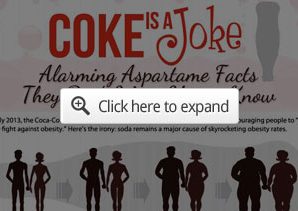This Common Food Ingredient Is ‘Scary as Hell’
More Information
By Dr. Mercola
Up to 180 million Americans use artificial sweeteners, including aspartame, routinely.1 But the idea that they’re a safe alternative to sugar, even one that promotes weight loss, is a deceiving myth. In fact, the story of aspartame has been deceitful from the beginning.
Drug company G.D. Searle & Company first discovered aspartame in the 1960s. It was approved by the U.S. Food and Drug Administration (FDA) in 1974 based on studies submitted by the drug maker.
An FDA scientist pointed out “serious shortcomings” with all the studies the FDA used to make their approval decision. Tonic, which described the story of aspartame’s approval as “scary as hell,” reported:
“For example, some rats in the studies died but were not autopsied after to discern the cause; in other cases, the aspartame was not mixed well enough into the feed and the rats were eating around it. There was also evidence of brain tumors in the rats in several studies,” they said.2
The FDA’s next move was to set up a public board of inquiry composed of outside experts to investigate the safety of aspartame, and in 1980 that board unanimously rejected aspartame’s request for approval.
Meanwhile, many are not aware of Donald Rumsfeld’s involvement in the approval of aspartame. Rumsfeld served as White House chief of staff from 1974 to 1975. He was also secretary of defense from 1975 to 1977 and again from 2001 to 2006. In 1976, however, Rumsfeld became CEO of G.D. Searle. Tonic commented:
“He was also on the transition team for Ronald Reagan, who was inaugurated in 1981. After the inauguration, Searle reapplied to the FDA for approval, at which point Reagan fired the FDA commissioner and replaced him with Arthur Hayes Hull Jr., who reapproved aspartame for dry products.”3
Just two years later the artificial sweetener was approved for use in liquid products, like diet soda, and the rest is history.
Serious Aspartame Safety Questions Remain
There’s a reason why, when asked whether or not he would consume aspartame, Dr. Robert Lustig, pediatric neuroendocrinologist at the University of California, San Francisco, said, “No way in hell.” As he told Tonic, “We just don’t have the data” to prove its safety.4
On the contrary, there’s mounting evidence that it’s dangerous. In 1996, for instance, researchers suggested that the increasing rate of brain tumors in the U.S. could be linked to aspartame, particularly since it was introduced to the U.S. market several years prior to a sharp increase in malignant brain tumors.5
They cited an early animal study that found an “exceedingly high incidence of brain tumors” in rats fed aspartame, as well as evidence that the aspartame molecule has “mutagenic potential.”
A study published in the American Journal of Industrial Medicine, which treated six groups of mice with aspartame from before their birth until their deaths, also found that this toxic artificial sweetener induces cancers of the liver and lungs in male mice.6
Another study of great importance was published in 2012.7 The study spanned more than 20 years and evaluated the link between aspartame intake and cancer. They found a clear association between aspartame consumption and non-Hodgkin’s Lymphoma and leukemia.
Artificial Sweeteners Might Make You Fat
Perhaps the greatest scam of all is including these “zero-calorie” sweeteners in diet foods and drinks, which people consume with the impression that they may help with weight loss. The opposite is actually true.
In April 2017, research presented at ENDO 2017, the Endocrine Society’s 99th annual meeting in Orlando, Florida, once again found that artificial sweeteners promote metabolic dysfunction that may promote the accumulation of fat.8
The study tested sucralose (brand name Splenda) on stem cells taken from human fat tissue, which revealed that a dose similar to what would be found in the blood of someone who drinks four cans of diet soda a day increased the expression of genes linked to fat production and inflammation, as well as increased fat droplets on cells.9
The study’s lead author, Dr. Sabyasachi Sen, associate professor of medicine and endocrinology at George Washington University in Washington D.C., noted in a press release:10
“From our study, we believe low-calorie sweeteners promote additional fat formation by allowing more glucose to enter the cells, and promotes inflammation, which may be more detrimental in obese individuals.”
The fact that the artificial sweetener was associated with increased glucose uptake in the cells was particularly concerning, as it could have detrimental effects for people with elevated blood sugar levels, like those with diabetes or pre-diabetes — a population that’s often told to swap sugar for the artificial sweeteners.11
Aspartame May Promote Obesity and Inflammation
Research has also linked aspartame to weight gain and obesity. A study on mice revealed that animals fed aspartame-laced drinking water gained weight and developed symptoms of metabolic syndrome while mice not fed the artificial sweetener did not.
Further, the researchers revealed that phenylalanine, an aspartame breakdown product, blocks the activity of a gut enzyme called alkaline phosphatase (IAP).
In a previous study, IAP was found to prevent the development of metabolic syndrome (and reduce symptoms in those with the condition) when fed to mice.12 Aspartame likely promotes obesity by interfering with IAP activity.
Mice in the study were fed either plain water or water infused with the equivalent amount of aspartame found in two to 3.5 cans of soda, along with a normal diet or a high-fat diet. Mice in the high-fat group that drank aspartame-infused water gained more weight than those eating the same diet without aspartame in their water.
Further, all the mice fed aspartame had higher blood sugar levels — an indicator of glucose intolerance — and higher levels of inflammatory protein TNF-alpha, which is suggestive of systemic inflammation. Given aspartame’s inhibition of IAP, the researchers suggested its use is counterproductive.
Other research found drinking aspartame-sweetened diet soda daily increased the risk of type 2 diabetes by 67 percent (regardless of whether the participants gained weight or not) and the risk of metabolic syndrome 36 percent.13
Artificial sweeteners may increase your risk of weight gain, obesity and other related problems like type 2 diabetes by inducing “metabolic derangements,” according to a report published in the journal Trends in Endocrinology & Metabolism.14
The Many Reasons to Ditch Diet Soda: Increased Risk of Dementia and Stroke
I don’t recommend drinking soda, whether regular or diet, but most people are aware of the pitfalls of sugar-sweetened soda. Diet soda, on the other hand, has managed to hold on to the reputation that it’s somehow a more sensible alternative. This is not at all the case.
A recent study has even found that drinking diet soda daily may increase your risk of stroke and dementia three-fold.15 Even drinking artificially sweetened beverages one to six times a week was linked to a 2.6 times greater risk of stroke.16 For a bit of background, when aspartame is in liquid form, as it is in diet soda, it breaks down into methyl alcohol, or methanol, which is then converted into formaldehyde and represents the root of the problem with aspartame.
Research has even found that the administration of aspartame to rats resulted in detectable methanol even after 24 hours, which might be responsible for inducing oxidative stress in the brain.17 Diet soda, which is often sweetened with aspartame, meanwhile has its own set of problems. People who drank diet soda had a 70 percent greater increase in waist size in a 10-year period compared to non-diet soda drinkers, for instance.
If you’re pregnant, you’ll also want to steer clear of artificial sweeteners. In 2016, a study found that women who consumed artificially sweetened beverages daily during pregnancy had babies with a two-fold higher risk of being overweight at the age of 1 year.18
Diet Soda Drinkers Have a 30 Percent Higher Risk of Depression
Preliminary research presented at the 65th annual meeting of the American Academy of Neurology found those who drank more than four cans or glasses of diet soda or other artificially sweetened beverages had a nearly 30 percent higher risk of depression compared to those who did not consume diet drinks.19
Meanwhile, a report published in the journal Trends in Endocrinology & Metabolism highlighted the fact that diet soda drinkers suffer the same health problems as those who opt for regular soda, such as excessive weight gain, type 2 diabetes, cardiovascular disease and stroke. The researchers noted:20
” … [C]onsuming sweet-tasting but noncaloric or reduced-calorie food and beverages [may] interfere with learned responses that normally contribute to glucose and energy homeostasis. Because of this interference, frequent consumption of high-intensity sweeteners may have the counterintuitive effect of inducing metabolic derangements.”
And the risks go on. Research published in PLOS One found regularly consuming artificially sweetened soft drinks is associated with several disorders of metabolic syndrome, including21
- Abdominal obesity
- Insulin resistance
- Impaired glucose intolerance
- Abnormally elevated fats in the blood
- High blood pressure
The study found drinking aspartame-sweetened diet soda daily increased the risk of type 2 diabetes by 67 percent (whether they gained weight or not) and the risk of metabolic syndrome 36 percent. For more on the detrimental effects of diet sodas, including in relation to aspartame and weight gain, check out our infographic below.
>>>>> Click Here <<<<<
Embed this infographic on your website:
Click on the code area and press CTRL + C (for Windows) / CMD + C (for Macintosh) to copy the code
Try This When You’re Tempted by Artificial Sweeteners
Although they taste sweet, when it comes to your health it’s clear that artificial sweeteners like aspartame are sour. When a craving for sweets or artificial sweeteners strikes, resist the urge to reach for an artificially sweetened food or beverage and eat something naturally sour instead.
Sour taste, such as that from fermented vegetables or water spruced up with lemon or lime juice, helps to reduce cravings for sweets. If that doesn’t appeal to you, try a cup of organic black coffee, an opioid receptor that can bind to your opioid receptors, occupy them and essentially block your addiction to other opioid-releasing food.22,23
I also recommend addressing your cravings on an emotional level. Turbo Tapping, which is a version of the Emotional Freedom Techniques (EFT), is specifically suited to help eliminate sweet cravings and it can be done virtually anywhere, anytime a craving strikes.
Source:: Mercola Health Articles




 Body Charge Nutrition is a premium nutritional supplement provider based in Western Canada offering only products and information that are of the highest quality and integrity. Through knowledge and personal experience, it is our goal to assist you with taking control of your health.
Body Charge Nutrition is a premium nutritional supplement provider based in Western Canada offering only products and information that are of the highest quality and integrity. Through knowledge and personal experience, it is our goal to assist you with taking control of your health.